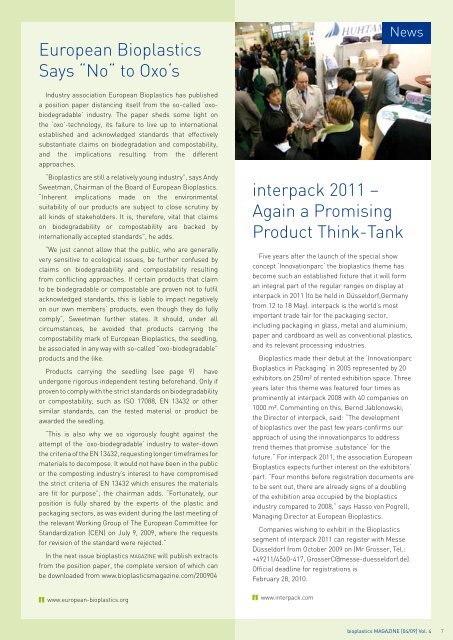bioplasticsMAGAZINE_0904
bioplasticsMAGAZINE_0904
bioplasticsMAGAZINE_0904
Create successful ePaper yourself
Turn your PDF publications into a flip-book with our unique Google optimized e-Paper software.
European Bioplastics<br />
Says “No“ to Oxo‘s<br />
News<br />
Industry association European Bioplastics has published<br />
a position paper distancing itself from the so-called ‘oxobiodegradable’<br />
industry. The paper sheds some light on<br />
the ‘oxo’-technology, its failure to live up to international<br />
established and acknowledged standards that effectively<br />
substantiate claims on biodegradation and compostability,<br />
and the implications resulting from the different<br />
approaches.<br />
“Bioplastics are still a relatively young industry”, says Andy<br />
Sweetman, Chairman of the Board of European Bioplastics.<br />
“Inherent implications made on the environmental<br />
suitability of our products are subject to close scrutiny by<br />
all kinds of stakeholders. It is, therefore, vital that claims<br />
on biodegradability or compostability are backed by<br />
internationally accepted standards”, he adds.<br />
“We just cannot allow that the public, who are generally<br />
very sensitive to ecological issues, be further confused by<br />
claims on biodegradability and compostability resulting<br />
from conflicting approaches. If certain products that claim<br />
to be biodegradable or compostable are proven not to fulfil<br />
acknowledged standards, this is liable to impact negatively<br />
on our own members’ products, even though they do fully<br />
comply”, Sweetman further states. It should, under all<br />
circumstances, be avoided that products carrying the<br />
compostability mark of European Bioplastics, the seedling,<br />
be associated in any way with so-called ”oxo-biodegradable”<br />
products and the like.<br />
Products carrying the seedling (see page 9) have<br />
undergone rigorous independent testing beforehand. Only if<br />
proven to comply with the strict standards on biodegradability<br />
or compostability, such as ISO 17088, EN 13432 or other<br />
similar standards, can the tested material or product be<br />
awarded the seedling.<br />
“This is also why we so vigorously fought against the<br />
attempt of the ‘oxo-biodegradable’ industry to water-down<br />
the criteria of the EN 13432, requesting longer timeframes for<br />
materials to decompose. It would not have been in the public<br />
or the composting industry’s interest to have compromised<br />
the strict criteria of EN 13432 which ensures the materials<br />
are fit for purpose”, the chairman adds. “Fortunately, our<br />
position is fully shared by the experts of the plastic and<br />
packaging sectors, as was evident during the last meeting of<br />
the relevant Working Group of The European Committee for<br />
Standardization (CEN) on July 9, 2009, where the requests<br />
for revision of the standard were rejected.”<br />
In the next issue bioplastics MAGAZINE will publish extracts<br />
from the position paper, the complete version of which can<br />
be downloaded from www.bioplasticsmagazine.com/20<strong>0904</strong><br />
interpack 2011 –<br />
Again a Promising<br />
Product Think-Tank<br />
Five years after the launch of the special show<br />
concept ‘Innovationparc‘ the bioplastics theme has<br />
become such an established fixture that it will form<br />
an integral part of the regular ranges on display at<br />
interpack in 2011 (to be held in Düsseldorf,Germany<br />
from 12 to 18 May). interpack is the world‘s most<br />
important trade fair for the packaging sector,<br />
including packaging in glass, metal and aluminium,<br />
paper and cardboard as well as conventional plastics,<br />
and its relevant processing industries.<br />
Bioplastics made their debut at the ‘Innovationparc<br />
Bioplastics in Packaging‘ in 2005 represented by 20<br />
exhibitors on 250m² of rented exhibition space. Three<br />
years later this theme was featured four times as<br />
prominently at interpack 2008 with 40 companies on<br />
1000 m². Commenting on this, Bernd Jablonowski,<br />
the Director of interpack, said: “The development<br />
of bioplastics over the past few years confirms our<br />
approach of using the innovationparcs to address<br />
trend themes that promise ‚substance‘ for the<br />
future.“ For interpack 2011, the association European<br />
Bioplastics expects further interest on the exhibitors‘<br />
part. “Four months before registration documents are<br />
to be sent out, there are already signs of a doubling<br />
of the exhibition area occupied by the bioplastics<br />
industry compared to 2008,“ says Hasso von Pogrell,<br />
Managing Director at European Bioplastics.<br />
Companies wishing to exhibit in the Bioplastics<br />
segment of interpack 2011 can register with Messe<br />
Düsseldorf from October 2009 on (Mr Grosser, Tel.:<br />
+49211/4560-417, GrosserC@messe-duesseldorf.de).<br />
Official deadline for registrations is<br />
February 28, 2010.<br />
www.european-bioplastics.org<br />
www.interpack.com<br />
bioplastics MAGAZINE [04/09] Vol. 4


















